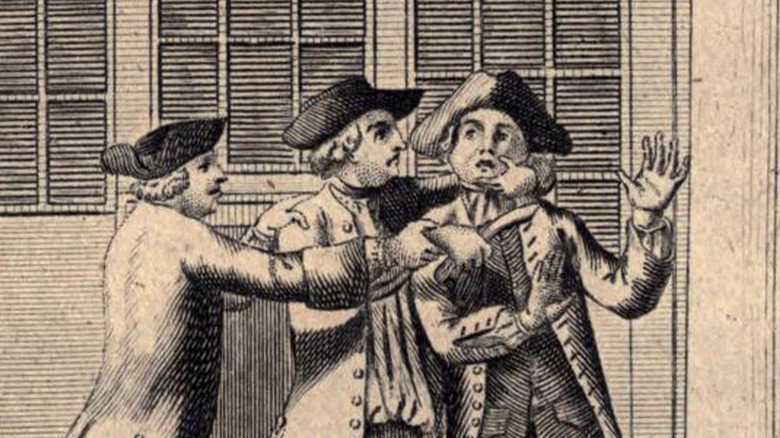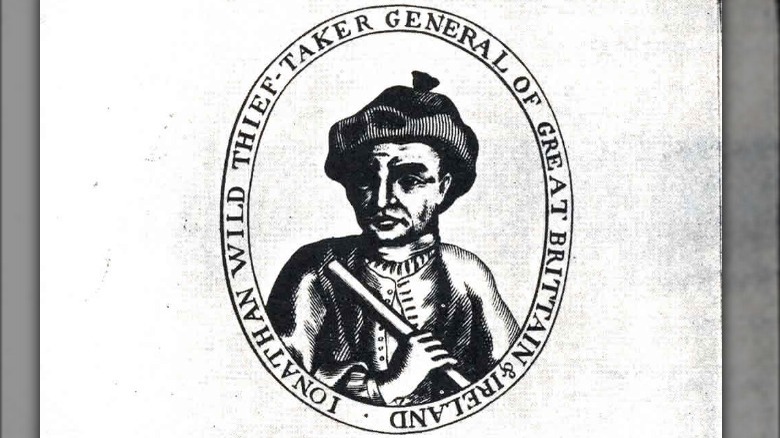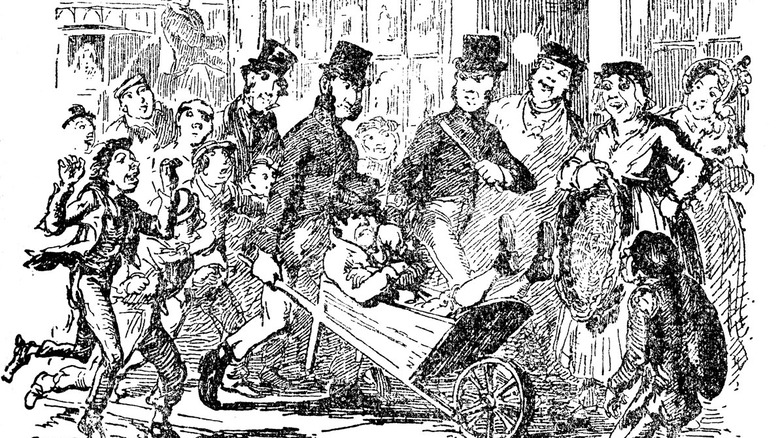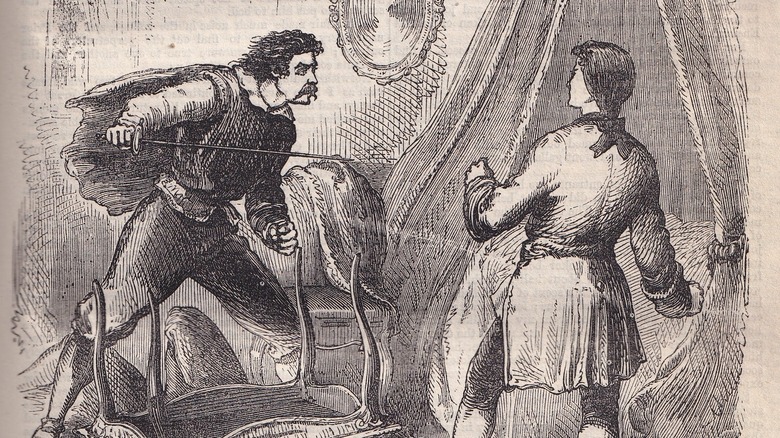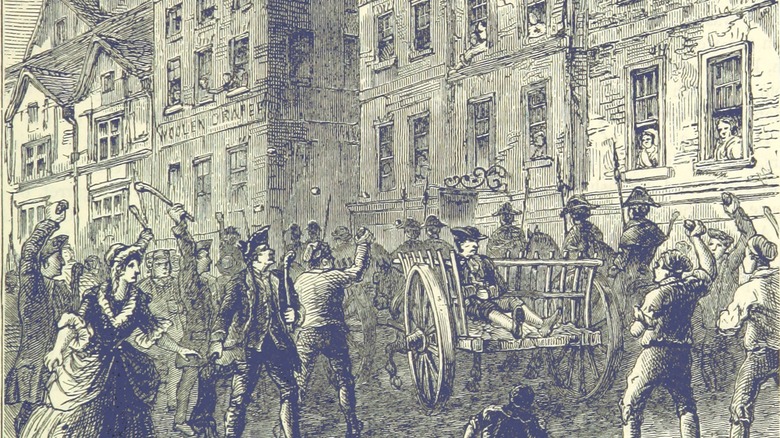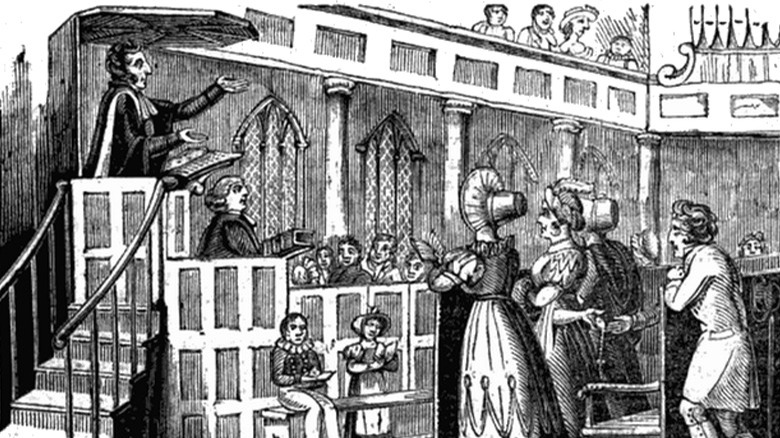How Jonathan Wild's Criminal Empire Came To An End
The name Jonathan Wild might not be particularly well-known today, but in early 18th century England, he was one the most infamous figures of the time as the leader of a criminal empire that encompassed everything from gangs of highwaymen to extortion plots to fencing stolen property. However, what makes Wild's story even more interesting wasn't just that he was an evil mastermind that antagonized the burgeoning police force. He played both sides — crime and the law — against each other, profiting throughout the process until he was finally brought to justice.
In contrast to his mind-boggling achievements, Wild's early life was relatively basic and unremarkable. According to Encyclopedia Britannica, Wild was born in Wolverhampton region in the early 1680s and was the oldest of five children, per "The Life of Jonathan Wild." His family was not a wealthy one, and while still in his teens he got married and had his own child. However, fidelity seemed not to be Wild's strong suit, and he abandoned his wife and son a few years later to make his way to London. Stories differ on whether he worked there as a servant or as a buckle-maker, a trade he had apprenticed for, per Head Stuff. Regardless, neither lasted and without a steady income, Wild fell into debt and was sent to prison — which ended up being where he picked up tips on crime and made connections with the underbelly of London society.
The seeds of criminality
Wild was sent to a debtor's prison called Wood Street Compter. However, while Wild's crimes might have been equal to other those of other inmates, Wild didn't remain a regular prisoner for long. According to Head Stuff, Wild's charm and determination to get out of his miserable situation helped him become something known as a "trustee," which both meant that he could run errands for guards and even accompany them off property to bring other criminals to justice. Wild managed to do this by being social and being smart — and prisoners would come to him with ideas about their next dastardly plots to get Wild's advice on their schemes.
However, what ultimately became a more important aspect of his time at Wood Street was the company he kept. In addition to learning tips of the criminal trade from other inmates, he also met a woman named Molly Milliner. According to "The Thief-Taker Hangings," Milliner was described at the time as "a buttock and file," a term that meant she operated both as a pickpocket and a sex worker. Moreover, she allegedly knew most of London's "felonious inhabitants."
Wild and Milliner soon developed a romantic relationship with one another, despite the fact that they were both married to other people. Their relationship continued once they were released from jail and Wild soon found himself enmeshed with Milliner's shadowy circle.
How the empire was launched
The first order of business for Wild and Milliner upon being freed from jail was to open a brothel — which was not illegal at the time, per The Independent. It was at the brothel that Wild and Milliner would start their first scam: an upgraded version of the aforementioned "buttock and file."
While men were being entertained by sex workers or otherwise distracted, Wild and Milliner would rob them. However, as noted in "The Thief-Taker Hangings," this didn't necessarily mean taking money or jewelry. Instead, what was commonly taken included letters, diaries, or other documents — which was much easier to pretend had fallen out or gotten lost in innocent ways. Wild and Milliner would then blackmail their victims, and offer the return of their items for the price of their silence on both the subject matter of the materials and the fact that they had been found in a brothel.
This scam proved to be incredibly successful for the pair, and by 1713, Wild and Milliner had moved their personal residence to Cripplegate, a much more respectable area of London. More importantly, Wild had enough funds to purchase a brandy shop near their home, which quickly became the locus of his second scam.
The scam continues
Wild sought to expand his empire yet again by targeting an even larger audience — this time by taking advantage of the legal system. At the time, there was a "minimal" police force; instead, citizens were expected to patrol the streets (per London Lives). But crime exploded in the late 17th and early 18th centuries, fueled by London's population growth and the development of a middle class that was easier to target than the wealthy elite. As criminals became more organized and dangerous, forms of law enforcement had to adapt, and the position of the "thief-taker" was developed.
The thief-taker was sort of the early prototype of a bounty hunter. According to London Lives, a number of royal proclamations issued between 1692 and 1752 offered financial rewards for anyone who could catch and help convict robbers or thieves. These rewards were very large sums for the time, so the position was very lucrative.
Wild took advantage of the job by calling on his old thieving friends and developed a ring that would steal pocketbooks, jewelry, accessories, and other items. Sometimes, he would turn in the thieves for the full reward — sometimes blaming a patsy or rival. However, most of the time, Wild would pretend to have innocently come into information about stolen items and offer to broker their return to the original owner — but for a fee (via Reynolds News).
The media added to Wild's fame
By running this scam, Wild actually endured high regard from much of English society, who believed that he was catching criminals instead of orchestrating them. He also took advantage of the media — which was just beginning to develop in the country. According to the UK News Media Association, the first daily newspaper in the country, "The Daily Courant," was established in 1702.
It was a major success, and Wild took advantage of its circulation by publishing accounts of items he had "found" as a way to maintain his facade of innocence. Wild's go-to claim was that he had spoken to a pawn broker who had been suspicious of merchandise.
However, his notoriety ironically made his business more complicated. In light of the added attention, Wild needed to figure out ways to store stolen goods away from his known property. To do this, he rented multiple warehouses and boats to ship his loot away in emergencies; this ended up being his big downfall.
Though Wild ran a tight ship with his group of hired thugs, the saying "no honor amongst thieves" ended up holding true. A petty argument between a captain and mate who worked at Wild's sloop landed the pair in jail, and Wild organized a violent mob to jailbreak the captain. This act was sloppy and out of character, and placed Wild at the scene of a crime (per Head Stuff).
The fall of an empire
But things got worse. While Wild was still under attack for orchestrating the riot, the first mate flipped on both the captain and Wild in an act of revenge (via Murderers, Robbers, and Highwaymen). Critically, the first mate had information on the location of Wild's warehouses, and a search found hundreds of stolen items on his property.
Understandably, the British public was outraged that a man they had seen as a moral crusader had been a criminal mastermind all along, and there was little hope for mercy at Wild's trial. Daniel Defoe, a British journalist and spy, even wrote a pamphlet about the case (via Reynolds News).
"How infatuate were the people of this nation all this while! Did they consider, that at the very time that they treated this person with such a confidence, as if he had been appointed to the trade, he had, perhaps, the very goods in his keeping, waiting the advertisement for the reward, and that, perhaps, they had been stolen with that very intention?"
Wild's trial was a huge topic of interest; Defoe noted it was the largest audience he had ever seen at the Old Bailey. Moreover, the overwhelming evidence and public disdain led to a death sentence (per Head Stuff). Wild was hanged on May 24, 1725, ending the life of the man who created one of the world's first major modern criminal networks.
